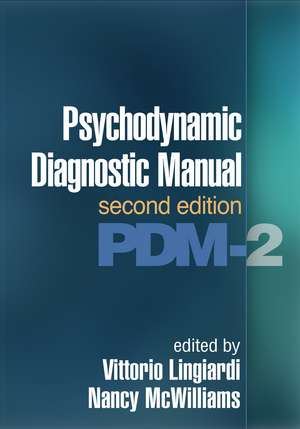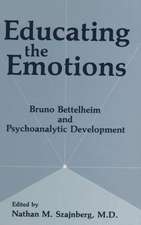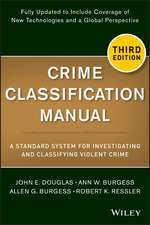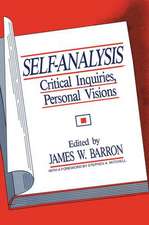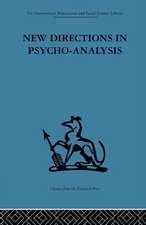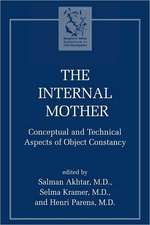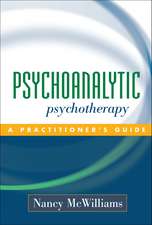Psychodynamic Diagnostic Manual, Second Edition: PDM-2
Editat de Vittorio Lingiardi, Nancy McWilliamsen Limba Engleză Paperback – 14 iul 2017
New to This Edition
*Significant revisions to all chapters, reflecting a decade of clinical, empirical, and methodological advances.
*Chapter with extended case illustrations, including complete PDM profiles.
*Separate section on older adults (the first classification system with a geriatric section).
*Extensive treatment of psychotic conditions and the psychotic level of personality organization.
*Greater attention to issues of culture and diversity, and to both the clinician's and patient's subjectivity.
*Chapter on recommended assessment instruments, plus reproducible/downloadable diagnostic tools.
*In-depth comparisons to DSM-5 and ICD-10-CM throughout.
Sponsoring associations include the International Psychoanalytical Association, Division 39 of the American Psychological Association, the American Psychoanalytic Association, the International Association for Relational Psychoanalysis & Psychotherapy, the American Association for Psychoanalysis in Clinical Social Work, and five other organizations.
Winner--American Board and Academy of Psychoanalysis Book Prize (Clinical Category)
| Toate formatele și edițiile | Preț | Express |
|---|---|---|
| Paperback (1) | 576.62 lei 3-5 săpt. | +67.38 lei 7-11 zile |
| Guilford Publications – 14 iul 2017 | 576.62 lei 3-5 săpt. | +67.38 lei 7-11 zile |
| Hardback (1) | 777.30 lei 6-8 săpt. | |
| Guilford Publications – 19 iun 2017 | 777.30 lei 6-8 săpt. |
Preț: 576.62 lei
Preț vechi: 626.76 lei
-8% Nou
110.33€ • 115.21$ • 91.11£
Carte disponibilă
Livrare economică 25 martie-08 aprilie
Livrare express 11-15 martie pentru 77.37 lei
Specificații
ISBN-10: 1462530540
Pagini: 1078
Dimensiuni: 178 x 254 x 54 mm
Greutate: 1.77 kg
Ediția:2
Editura: Guilford Publications
Colecția Guilford Press
Public țintă
Professional and Professional Practice & DevelopmentRecenzii de la cititorii Books Express
Anonim a dat nota:
Acesta este un text de diagnostic incredibil și este o alternativă evoluată a clinicienilor la DSM-5. Deși conturează și conectează în mod specific teoria psihodinamică la DSM-5 într-o secțiune specifică, merge mai adânc decât DSM prin axele sale unice. Extrem de util pentru o mai bună înțelegere a oricărei suferințe psihice.
Cuprins
I. Adulthood
1. Personality Syndromes—P Axis, Nancy McWilliams & Jonathan Shedler
2. Profile of Mental Functioning--M Axis, Vittorio Lingiardi & Robert F. Bornstein
3. Symptom Patterns: The Subjective Experience—S Axis, Emanuela Mundo & John Allison O’Neil
II. Adolescence
4. Profile of Mental Functioning for Adolescents—MA Axis, Mario Speranza & Nick Midgley
5. Emerging Personality Patterns and Syndromes in Adolescence—PA Axis, Johanna C. Malone & Norka Malberg
6. Adolescent Symptom Patterns: The Subjective Experience—SA Axis, Mario Speranza
III. Childhood
7. Profile of Mental Functioning for Children—MC Axis, Norka Malberg & Larry Rosenberg
8. Emerging Personality Patterns and Difficulties in Childhood—PC Axis, Norka Malberg, Larry Rosenberg, & Johanna C. Malone
9. Child Symptom Patterns: The Subjective Experience—SC Axis, Norka Malberg & Larry Rosenberg
IV. Infancy and Early Childhood
10. Mental Health and Developmental Disorders in Infancy and Early Childhood—IEC 0–3, Anna Maria Speranza & Linda Mayes
V. Later Life
11. Introduction to Part V, Franco Del Corno & Daniel Plotkin
12. Profile of Mental Functioning for the Elderly—ME Axis, Franco Del Corno & Daniel Plotkin
13. Personality Patterns and Syndromes in the Elderly—PE Axis, Franco Del Corno & Daniel Plotkin
14. Symptom Patterns in the Elderly: The Subjective Experience—SE Axis, Franco Del Corno & Daniel Plotkin
VI. Assessment and Clinical Illustrations
15. Assessment within the PDM-2 Framework, Sherwood Waldron, Robert M. Gordon, & Francesco Gazzillo
16. Clinical Illustrations and PDM-2 Profiles, Franco Del Corno, Vittorio Lingiardi, & Nancy McWilliams
Appendix. Psychodiagnostic Charts (PDCs)
Notă biografică
Nancy McWilliams, PhD, ABPP, is Visiting Professor Emerita in the Graduate School of Applied and Professional Psychology at Rutgers, The State University of New Jersey, and has a private practice in Lambertville, New Jersey. She is author of Psychoanalytic Diagnosis, Second Edition; Psychoanalytic Case Formulation; Psychoanalytic Psychotherapy; and Psychoanalytic Supervision; and is coeditor of Psychodynamic Diagnostic Manual, Second Edition. She is a past president of the Society for Psychoanalysis and Psychoanalytic Psychology, Division 39 of the American Psychological Association (APA), and is on the editorial board of Psychoanalytic Psychology. A graduate of the National Psychological Association for Psychoanalysis, Dr. McWilliams is also affiliated with the Center for Psychotherapy and Psychoanalysis of New Jersey, and serves on the Board of Trustees of the Austen Riggs Center in Stockbridge, Massachusetts. She is the recipient of honors including the Gradiva Award from the National Association for the Advancement of Psychoanalysis; the Goethe Scholarship Award from the Section on Psychoanalytic and Psychodynamic Psychology of the Canadian Psychological Association; the Rosalee Weiss Award from the Division of Independent Practitioners of the APA; the Laughlin Distinguished Teacher Award from the American Society of Psychoanalytic Physicians; the Hans H. Strupp Award from the Appalachian Psychoanalytic Society; and the International, Leadership, and Scholarship Awards from APA Division 39. Dr. McWilliams is an honorary member of the American Psychoanalytic Association, the Moscow Psychoanalytic Society, the Institute for Psychoanalytic Psychotherapy of Turin, Italy, and the Warsaw Scientific Association for Psychodynamic Psychotherapy. Her writings have been translated into 20 languages.
Recenzii
"People are more than their diagnoses. Diagnostic formulations rooted in the diversity and humanity of the people we aim to help and, at the same time, rooted in carefully evaluated empirical evidence represent the real gold standard in our field. This synthesis is precisely what PDM-2 aims for. The book will be of value both to practicing clinicians and to those teaching the next generation to think in ways that combine rigor with empathy for the client's experience."--Paul L. Wachtel, PhD, Distinguished Professor, Doctoral Program in Clinical Psychology, City College and the Graduate Center of the City University of New York
"It is quite difficult to achieve agreement on psychiatric diagnosis, and almost impossible to achieve agreement on psychodynamic concepts. The most interesting aspects of human nature are inherently the very hardest to agree upon, because they are also the most idiosyncratic, complicated, buried, and inferential. This heroically ambitious book is a startlingly successful synthesis of the confusing babel of different psychoanalytic tongues. It will improve the daily practice of psychodynamic clinicians, enliven teaching in the field, and contribute to the infant field of psychodynamic research. A labor of love and erudition."--Allen Frances, MD, Department of Psychiatry and Behavioral Sciences (Emeritus), Duke University
"A masterful work that fills a gap in the clinical literature. This 21st-century psychodynamic manual not only covers diagnostic formulations, but also presents validated research tools that can be used in assessment of patients. The editors have recruited leaders in the field from across the globe to contribute to this major, far-reaching resource. PDM-2 takes a lifespan approach, covering infancy, childhood, adolescence, adulthood, and old age. Crucially, it takes seriously the need to integrate research and practice, with clear comparisons between the PDM-2 and DSM and ICD diagnostic systems. The inclusion of extensive case material helps the editors achieve their goal of addressing the complexities rather than just the symptoms of patients."--Miriam Steele, PhD, Department of Psychology, The New School for Social Research
Descriere
Now completely revised (over 90% new), this is the authoritative diagnostic manual grounded in psychodynamic clinical models and theories. Explicitly oriented toward case formulation and treatment planning, PDM-2 offers practitioners an empirically based, clinically useful alternative or supplement to DSM and ICD categorical diagnoses. Leading international authorities systematically address personality functioning and psychological problems of infancy, childhood, adolescence, adulthood, and old age, including clear conceptualizations and illustrative case examples. Purchasers get access to a companion website where they can find additional case illustrations and download and print five reproducible PDM-derived rating scales in a convenient 8 1/2" x 11" size.
New to This Edition
*Significant revisions to all chapters, reflecting a decade of clinical, empirical, and methodological advances.
*Chapter with extended case illustrations, including complete PDM profiles.
*Separate section on older adults (the first classification system with a geriatric section).
*Extensive treatment of psychotic conditions and the psychotic level of personality organization.
*Greater attention to issues of culture and diversity, and to both the clinician's and patient's subjectivity.
*Chapter on recommended assessment instruments, plus reproducible/downloadable diagnostic tools.
*In-depth comparisons to DSM-5 and ICD-10-CM throughout.
Sponsoring associations include the International Psychoanalytical Association, Division 39 of the American Psychological Association, the American Psychoanalytic Association, the International Association for Relational Psychoanalysis & Psychotherapy, the American Association for Psychoanalysis in Clinical Social Work, and five other organizations.
